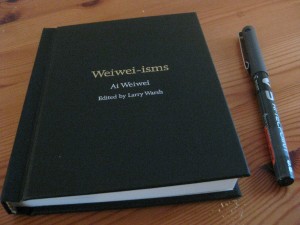Books come in all shapes and sizes, but perhaps the most potent format is both small and black. The collected quotes of Ai Weiwei should have come in nothing less.
Editor Larry Warsh has trawled through some 74 interviews with the Chinese artist to bring readers in the West a meditation on his life and situation in soundbites.
Then again, his countrymen have always liked to keep things short and snappy. Ai tells us that the quotations of Chairman Mao were rarely more than a tweet-length.
Admittedly, China’s pictographic use of Twitter allows them 140 words rather than 140 characters, but still. Confucius can be quoted just four words at a time, says Ai.
Since these are verbal epithets, Weiwei-isms contains a degree of repetition and odd moments of banality. A modern day Shakespeare, “might be writing on Twitter.†Really!?
But if that obvious statement were to come true, the bard could not do better than this from Ai’s twitter feed (@aiww): “The world is a sphere, there is no East or West.â€
The ultimate power of this book lies not in the words, however, but in the free-wheeling attitude they represent in one of the most restrictive societies on the planet.
“Expressing oneself is like a drug. I’m so addicted to it,†says Ai, who has indeed found the most dangerous and least legal narcotic in China.
As has been much publicised, in 2011 he was busted and spent 81 days behind bars. “During the days in detention I thought most about the moon,†he says, incorrigibly.
Ai’s belief in free speech makes interview-giving an important part of his role in the art world. Along with the social media usage, one wants to call it a practice, but that word sounds too academic.
Which this tweet certainly isn’t: “Overturning police cars is a super-intense workout. It’s probably the only sport I enjoy.†This allies him with rebel artists Voina in Russia, who did just that.
Artists in the West have always taken risks, be that earning the displeasure of the church, rejection by the Paris Salon or simply the derision of the gallery going public.
But on the whole making art is a legitimate enough business. Ai meanwhile is risking his neck and this gives his art another dimension. Call it a sort of realism.
Despite our relative freedoms, his little black book really is a manifesto. Ai may be kicking against the pricks, but he makes it look easy, irrestistible, even enjoyable. So join him.
Weiwei-isms (pp125) is edited by Larry Warsh and published by Princeton University Press. Available in all good bookshops, and this bad one.
